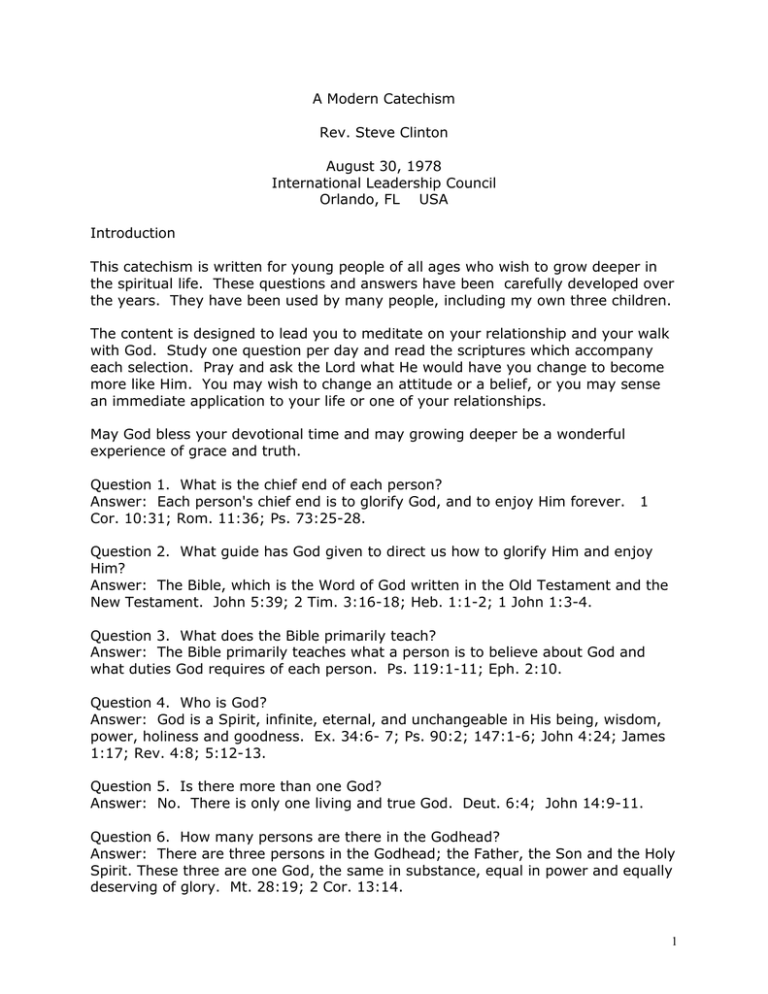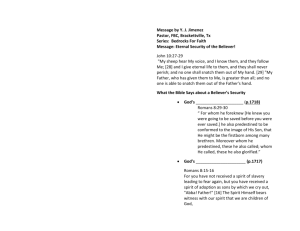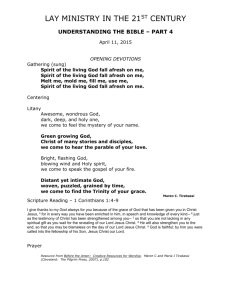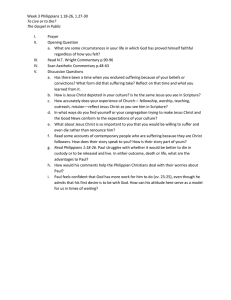A Modern Catechism Rev. Steve Clinton August 30, 1978
advertisement

A Modern Catechism Rev. Steve Clinton August 30, 1978 International Leadership Council Orlando, FL USA Introduction This catechism is written for young people of all ages who wish to grow deeper in the spiritual life. These questions and answers have been carefully developed over the years. They have been used by many people, including my own three children. The content is designed to lead you to meditate on your relationship and your walk with God. Study one question per day and read the scriptures which accompany each selection. Pray and ask the Lord what He would have you change to become more like Him. You may wish to change an attitude or a belief, or you may sense an immediate application to your life or one of your relationships. May God bless your devotional time and may growing deeper be a wonderful experience of grace and truth. Question 1. What is the chief end of each person? Answer: Each person's chief end is to glorify God, and to enjoy Him forever. Cor. 10:31; Rom. 11:36; Ps. 73:25-28. 1 Question 2. What guide has God given to direct us how to glorify Him and enjoy Him? Answer: The Bible, which is the Word of God written in the Old Testament and the New Testament. John 5:39; 2 Tim. 3:16-18; Heb. 1:1-2; 1 John 1:3-4. Question 3. What does the Bible primarily teach? Answer: The Bible primarily teaches what a person is to believe about God and what duties God requires of each person. Ps. 119:1-11; Eph. 2:10. Question 4. Who is God? Answer: God is a Spirit, infinite, eternal, and unchangeable in His being, wisdom, power, holiness and goodness. Ex. 34:6- 7; Ps. 90:2; 147:1-6; John 4:24; James 1:17; Rev. 4:8; 5:12-13. Question 5. Is there more than one God? Answer: No. There is only one living and true God. Deut. 6:4; John 14:9-11. Question 6. How many persons are there in the Godhead? Answer: There are three persons in the Godhead; the Father, the Son and the Holy Spirit. These three are one God, the same in substance, equal in power and equally deserving of glory. Mt. 28:19; 2 Cor. 13:14. 1 Question 7. What are the decrees of God? Answer: The decrees of God are his eternal purpose, according to His will, whereby He has ordained whatever comes to pass. Rom. 8:28-30; Eph. 1:4,11; Heb. 13:20. Question 8. How does God fulfill His decrees? Answer: God fulfills His decrees through creation and providence. Gen. 1:1,27-28; 8:22; Ex. 19:5-6; Ps. 68:19-20; Col. 1:16-20; Rev. 4:11; 5:13. Question 9. How did God create mankind? Answer: God created mankind, male and female, in His own image, to rule over the earth. Gen. 1:26-28. Question 10. What do we call the relationship God established with mankind through Adam? Answer: We call the relationship God established with mankind a covenant of life. All people are to live in fellowship and obedience with God. Ps. 25:10,14; Hos. 6:7; Heb. 9:15. Question 11. Did Adam and Eve continue in the freedom of the relationship which they had with God? Answer: No. Adam and Eve, by their own will, fell by sinning against God. Gen. 3:6-8,13. Question 12. What is sin? Answer: Sin is any deliberate failure to conform to or transgression of the law of God. 1 John 3:4. Question 13. Did all mankind fall in Adam's and Eve's sin? Answer: Since God's covenant was with Adam and Eve, and all mankind through them, when Adam and Eve fell all mankind fell with them. Rom. 5:12; 1 Cor. 15:21-22. Question 14. Did God leave all mankind in sin and death? Answer: No. God promised to provide a way of salvation through a Redeemer. Gen. 3:15; Rom. 4:13; Heb. 13:20. Question 15. Who is the Redeemer? Answer: The only Redeemer is Jesus Christ, who is the eternal Son of God and our Savior. Luke 1:35; John 1:14; Acts 4:10-12; 1 Tim. 4:10. Question 16. How did Jesus, being God, become a human being? Answer: Jesus became a human being by taking a human body and a human soul, being conceived by the Holy Spirit, and born of the Virgin Mary. Luke 1:27, 31,35,42; Gal. 4:4; Heb. 2:14; 4:15. Question 17. How are we made partakers of the redemption purchased by Christ? 2 Answer: We are made partakers of the redemption purchased by Christ by the Holy Spirit who effectually calls us to faith in Jesus Christ. John 3:3-8; 1 Cor. 1:9; 2 Thess. 2:13; 2 Tim. 1:9; Titus 3:5; Heb. 6:4- 5,9. Question 18. What is effectual calling? Answer: Effectual calling is the work of God's Spirit convicting us of sin, enlightening our minds in the knowledge of Christ and persuading and enabling us to receive Jesus Christ by faith. John 6:44; 16:8; Acts 26:18; Eph. 2:8-9; Heb. 6:4-5. Question 19. Are all people redeemed by Christ and called by the Spirit? Answer: No. Christ died for all people and the Holy Spirit draws all people to Christ, but not all come, due to their own rejection of Christ. John 1:9; 12:32; 1 Tim. 4:10; Heb. 6:6; 1 John 2:2. Question 20. What are the benefits of our salvation when we turn to Christ by faith? Answer: The benefits of our salvation are many, but especially justification, regeneration, adoption, sanctification, perseverance, and glorification. Rom. 3:24; 5:1-11; 8:30; Eph. 1:3-14; Rev. 21:6-8. Question 21. What are the duties which God requires of each person? Answer: The duties which God requires of each person, both fallen and redeemed, are to walk with Him and to act in obedience to His will. Deut. 6:5-7; Micah 6:8; Mark 12:29-31; John 14:23; 15:10-12; 16:24. Question 22. Is anyone able to keep the commands of God? Answer: No, even though we do not have to sin as Christians, we all do sin. Gal. 5:17; James 3:2,5-6; I John 1:8,10. Question 23. When we sin, how can we regain a right fellowship with God? Answer: When we consciously disobey the Lord, we can regain a right fellowship by repenting of our sin and confessing it to the Lord Jesus. 1 John 1:9. Question 24. Besides walking with the Lord, what is the main thing He wants us to do? Answer: When we are maintaining our walk with the Lord in the power of the Spirit, then He wants us to share with other people how they can enter into a relationship with Jesus Christ. Matt. 28: 18-20. Question 25. How can other people enter into a relationship with Jesus Christ? Answer: People can enter into a personal relationship with Jesus Christ by believing that He is God's Son and their personal savior. John 1:12; 14:6; Acts 16:31; Rev. 3:20. FOR FURTHER READING Bill Bright, The Holy Spirit. New Life Publications, Orlando FL Millard Erickson, Introducing Christian Doctrine. Baker, Grand Rapids, MI. 3 Richard Foster, Celebration of Discipline. Harper, San Francisco. Bing Hunter, The God Who Hears. InterVarsity, Downers Grove, IL. Andrew Murray, With Christ in the School of Prayer. A. W. Tozer, The Knowledge of the Holy. NY: Harper. 4








